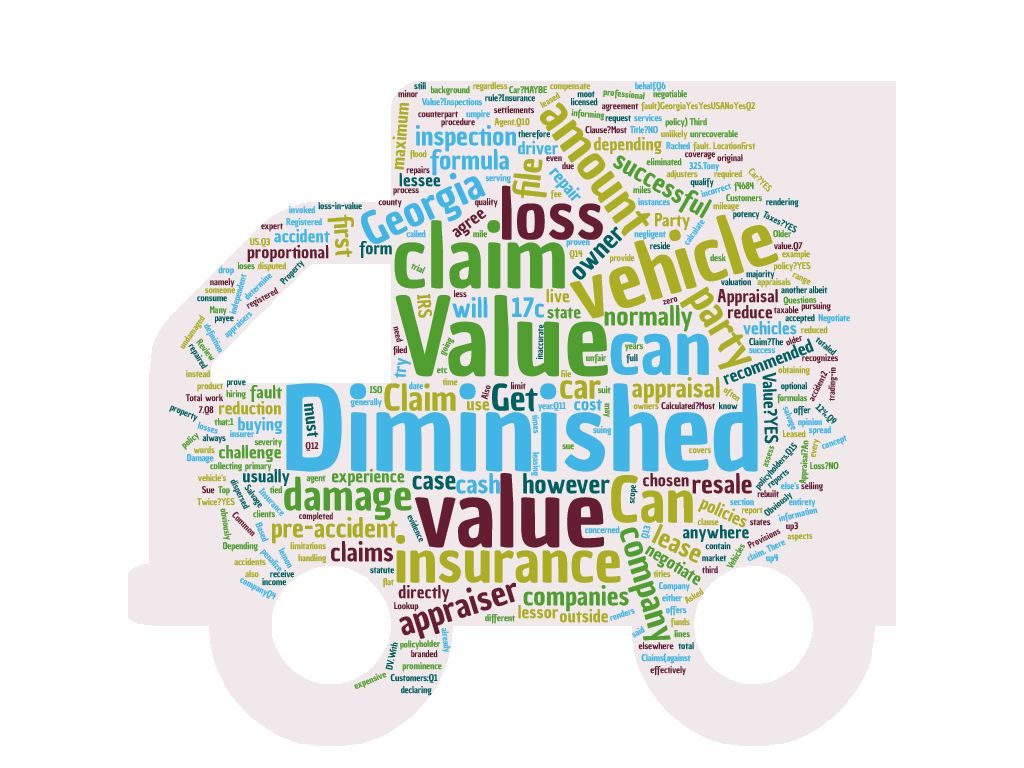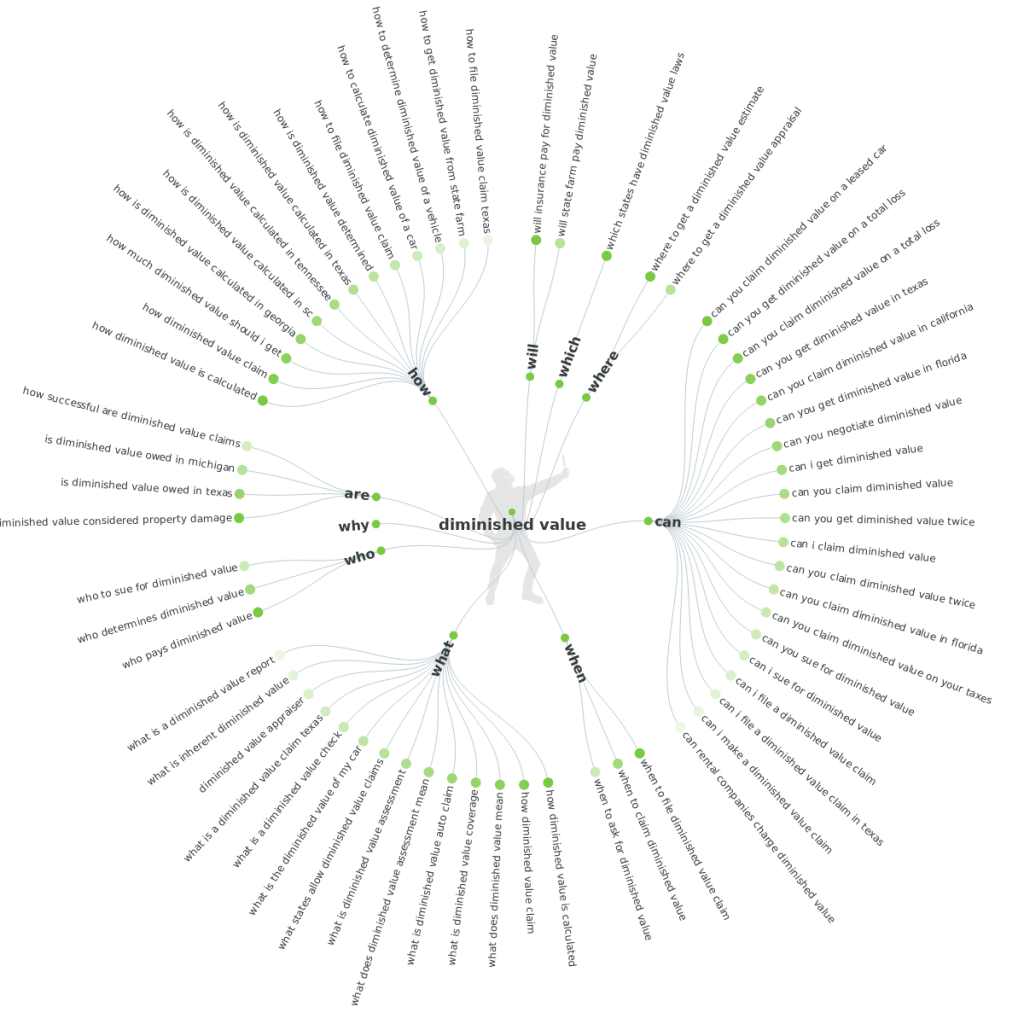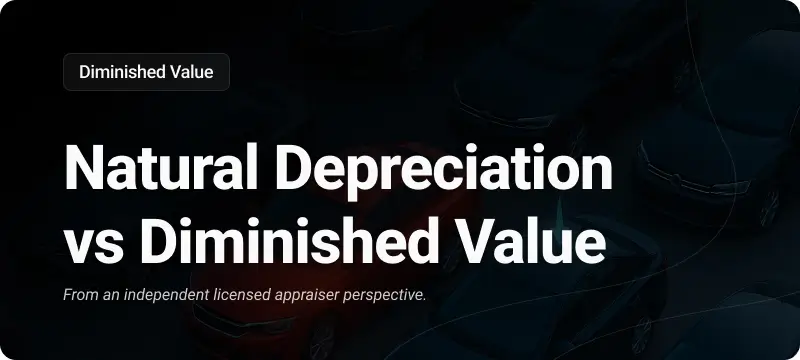Top 15 Most Common Diminished Value Questions Asked by our Customers:
-
Q1: Can I file a Diminished Value claim against my own policy?

YES. In Georgia, even if you’re at fault, your insurance company is required to compensate you for your loss in resale value on an accepted claim.
There is no such coverage elsewhere in the US, so if it’s your fault and you live outside of the state of Georgia, you are unlikely to receive DV.
With that said, you can always file a DV claim against another driver if you’re not at fault.
Location First Party DV Claims
(Against your policy)Third Party DV Claim
(someone else’s fault)Georgia Yes Yes USA No Yes -
Q2: Where do I Get a Diminished Value Appraisal?
An appraisal is by definition the work product and opinion of a professional appraiser. Many companies offer such services; however, the potency and success of your claim is directly tied to the prominence, experience and background of your chosen expert.
Appraisal reports start at $275. DVGA Price List.
Tony Rached, the owner of Diminished Value of Georgia, is licensed in 9 states and is the most successful DV appraiser in the US.
-
Q3: Can I Claim Diminished Value on a Leased Car?
MAYBE. Based on our experience, less than 40% of DV claims on leased vehicles are successful. Obviously, the vehicle itself loses value regardless of who the owner is, however, claim funds are normally dispersed to the “loss payee”; this is usually the owner of the vehicle, in this case that’s the leasing company (lessor).
Customers are usually successful in collecting Diminished Value if they can prove to the insurance company that:
1- Provisions in the lease agreement penalize them for the loss in resale value due to the accident
2- The lessee will be buying the vehicle when the lease is up
3- The lessee is selling or trading-in the vehicle before the lease is up
4- The lessor will not be pursuing the same claim against the insurance company -
Q4: Can I Get Diminished Value on a Total Loss?
NO. Diminished Value is the reduction in value between an undamaged and repaired vehicle, this is obviously not the case when the car is totaled. By declaring the car a total loss, the insurance company is effectively buying the car from you for the pre-accident cash value, rendering the concept of DV moot.
-
Q5: Can I Negotiate Diminished Value?
YES. All aspects of a property damage claim are negotiable. On first party claims (against your own policy), your chosen appraiser can also negotiate the claim on your behalf.
-
Q6: Can I Get Diminished Value on an Older Car?
YES. Diminished Value is proportional to the cash value of the vehicle. Damage to an expensive, albeit older vehicle, will still reduce its value.
-
Q7: Can I Claim Diminished Value Against my Taxes?
YES. The IRS recognizes unrecoverable insurance losses as a reduction in taxable income. Review IRS form f4684 for more information namely lines 5, 6, and 7.
-
Q8: Can I Claim Diminished Value Twice?
YES. Depending on your vehicle’s pre-accident value, some minor accidents may not consume the entirety of the loss range. In other words, every car has a maximum amount of value drop, this can be anywhere from 5 to 25% of the pre-accident value. For example, if accident #1 reduced the value by 4% of a 12% spread, accident #2 can reduce the value a maximum of 8% instead of the original 12%.
-
Q9: Can I Sue for Diminished Value?
YES. On a third-party claim, you can sue the other driver in the county in which they reside. The statute of limitations is different depending on which state you live in. In Georgia, you have 4 years from the date of loss to file suit against a negligent party (Property damage).
If you’re suing your own insurance, you can do that by serving their registered agent. Lookup Insurance Company Registered Agent.
-
Q10: When Should I File Diminished Value Claim?
The loss-in-value amount is proportional to the damage severity, therefore, a claim for DV should be filed after repairs are completed and the full scope of damage is know.
On a first party claim, policies generally have a time limit to file a claim, normally 1 year.
-
Q11: How Diminished Value Is Calculated?
Most insurance companies use a formula called “17c ” to calculate Diminished Value. This formula is proven to be inaccurate and unfair. To challenge 17c, vehicle owners must provide their own evidence in the form of a vehicle valuation report. Diminished Value of Georgia offers desk appraisals for a $275 flat fee.
-
Q12: What’s the 100,000-mile rule?
Insurance companies use a formula (17c) that renders a zero Diminished Value amount when a vehicles mileage is over 100,000 miles. This formula is incorrect, and you can challenge it by obtaining an independent appraisal.
-
Q13: Can I Get Diminished Value on a vehicle with a Salvage Title?
NO. Vehicles with branded titles (salvage, rebuilt, lemon, flood etc..) don’t qualify for Diminished Value as they are already eliminated from the primary resale market.
-
Q14: What’s an Appraisal Clause?
Most ISO policies contain a section that covers the claim handling procedure when the amount of loss is disputed. This can be the cost to repair, the cash value or the loss in value.
The appraisal clause can be invoked by either the policyholder or the insurer by hiring an outside appraiser and informing their counterpart. Both appraisers would assess the loss and try to agree to a value, if they can’t agree to an umpire.
The majority of first party claims don’t go through this process as often times, adjusters try to negotiate settlements directly with policyholders.
-
Q15: Do I need an inspection to determine Diminished Value?
Inspections are optional. Most clients request them however, if they’re concerned with the quality of repair. In some instances, and depending on the value of the vehicle, the amount of damage or the loss in value amount, an inspection is recommended. Also, if the case is going to trial, an inspection is recommended.
Form 17 │ Diminished Value Claim Review │ PD
"*" indicates required fields



